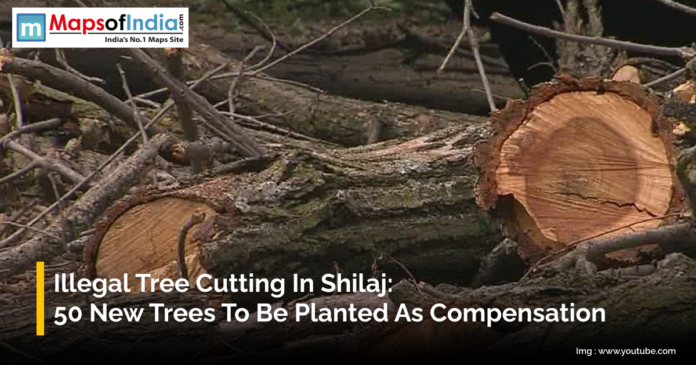An issue of illegal tree cutting has been noticed in Shilaj, Ahmedabad, where three fully grown green trees have been cut without official approval in the Shalin Residency. The event has brought to the fore a lot of serious approaches towards the negligence of environmental standards and the dwindling green cover as a result of the rapidly growing urban centres. Strict measures have been issued, and they have ordered the planting of fifty new trees to compensate for these as a form of ecological loss.
The move, seen as a violation of the mandatory procedure necessitating the seeking of approval by the concerned department, came as the trees were cut down by the local officials. In densely populated areas, where trees are not only useful in lowering the pollution, temperature control, and shading, such breaches are considered in a very serious manner. The green trees that were sliced off were constituents of the natural scenery, besides being the source of maintaining the environmental balance within the locality.
In response to the destruction, the administration has come up with a compensatory plantation act that states that the responsible parties must plant fifty new trees to replace three that were destroyed. The goal behind this action would be to refill the greenery and to deliver a clear message that no illegal felling of trees can land. The order is careful to stress that the saplings be cultivated until they become full-grown trees so that the substitution is beneficial to the environment in the long run.
The events have received mixed reactions among the locals of Shalin Residency and its environs. Although cutting down valuable trees makes some people sad, others think that the stern approach by authorities will make people desist from similar activities in future. Environmental activists have also cited that illegal tree cutting not only decreases green cover but also causes increased temperatures in populated cities like Ahmedabad, which degrades the air quality in these cities, too.
This action of the administration indicates a more expanded realization of the need to preserve the green space in the city. As cities continue to grow at a faster rate, trees become the key collateral in development related projects and have a costly long-term effect on the residents. One of the ways to mitigate such a loss is through compensatory plantation, though creating awareness and stricter enforcement is also important so that such lapses do not occur again.
The Shilaj case can remind us of the fact that the preservation of the existing trees is much more useful than planting trees afterwards. Police have also asked citizens to be on high alert and report any act of illegal cutting of trees within their regions. Through punishment, the administration will maintain equilibrium between urbanization and nature.










